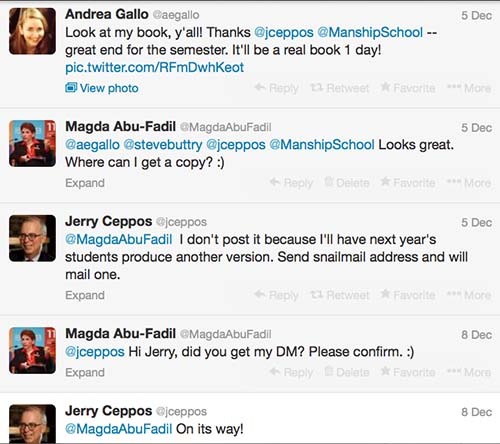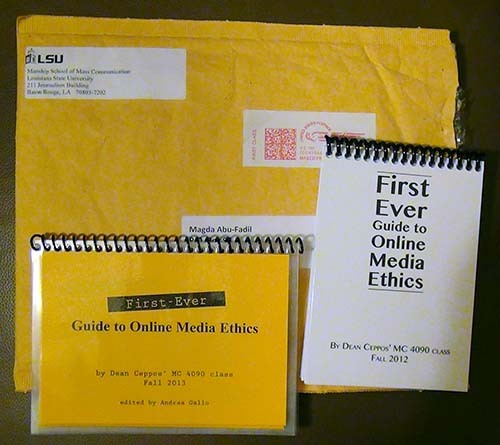It started with a tweet by Andrea Gallo, a Louisiana State University (LSU) student announcing the birth of her book.
Naturally, curiosity got the better of me and I clicked on the picture to find a yellow notebook about online media ethics - a subject dear to my heart given the ethical failures I encounter on a daily basis.
The next tweet was to ask how I could get a copy of the "First-Ever Guide to Online Media Ethics."
I'm not sure about "first-ever" since news organizations worldwide have for several years been incorporating online media ethics into their codes, guidelines for good journalistic practice, or whatever they call their respective operating rules.
But I was delighted to receive it this week and thumb through its well thought out sections on news judgment and conflicts, transparency, sourcing ethics, knowing your audience, plagiarism, when problems arise, photos and art, and social media.
Here's one tip journalists may overlook: "Ask your organization if there is a difference between online and print standards. If so, be clear about what these differences are."
In a number of countries where I've trained journalists, editors don't make a distinction between print and online media, and neither do their governments.
Some governments have slapped on penalties or sentences on producers of online content they deemed offensive, and have equated it with that of print publications.
In other countries officials have begun to deal with the issue through restrictive legislation such as requiring online media to obtain a license to operate, leading to a whole set of ethical problems.
Imagine the Huffington Post being licensed!
"Give context to your stories. Especially with follow-up stories, bear in mind that many people did not see or read the original story," is another great bit of advice.
It's amazing how often journalists assume news consumers know or understand the background.
In a globalized world, somebody, somewhere, other than your back yard, has an interest in your story and wants solid information to fully understand it.
A related point is examining one's own cultural values and filtering them out of one's journalism, PR, advertising and/or political communication practices, according to the guide.
In the section on transparency, I loved this item: "Media organizations should explain their actions."
How often do they, really?
Sourcing ethics is where media often stumble. We've seen the problem in large news organizations as well as with independent bloggers and activists.
So the advice is to question sources' motives and be sure that anonymous sources and commenters in stories are verifiable.
Knowing one's audience is imperative. The guide notes that word choice is important and words used incorrectly can be viewed as inaccurate and offensive.
Plagiarism, the bane of teachers and editors, is made easier by the plethora of online material.
"Do not let ego get in the way of giving credit," is one answer. If only so many inflated media egos would remember that.
What if an ethical dilemma comes up after the fact?
"Your organization should have a policy on taking down stories that have already been posted," is the guide's advice.
I wonder how many organizations have factored that into their policies and guidelines.
Very glaring examples I regularly see of unethical online content are in pictures and video.
"Remember that pictures often carry a lot of emotion, so aim for impact but avoid sensationalism. Strive for relevance, not emotion."
How true.
Much of what's out there about conflict zones, wars and disasters is devoid of relevance or added value, and instead aims for the gut or blows matters out of proportion.
I was intrigued by the authors' recommendation to quote social media as a last resort.
"Do everything in your power to check that the person you believe is tweeting or posting Facebook statuses really is," is a good one.
We're inundated with pseudo-information as well as good tips through social media in never-ending news cycles so it's incumbent upon us to go that extra mile and check on their veracity.
After all, it's only our reputation that's at stake.
The pocket size book with spiral binding and laminated pages is an annual project for LSU's Manship School of Mass Communication students.
Dean Jerry Ceppos, who teaches an undergraduate course called "Media Ethics and Social Responsibility" (MC 4090), assigns his charges production of this invaluable resource.
The 2012 class put out a shorter version and last year's crop came up with a very handy mini compendium covering a multitude of sins.
Since it's part of the students' course work, this year a newer (and probably more extensive) guide will be in the pipeline. Ceppos sent me the older versions by snail mail.
Thank you Jerry. I salute you and your students for a job well done.


